As the American automobile market took off in the 1920’s, the auto repair business took off with it, and naturally, the auto parts market did too. Founded in Atlanta, Georgia in 1925 as a Retail Cooperative by a group of businessmen headed by Mr. Carlyle Frasier, NAPA has been a key player in the auto parts business for nearly 90 years.
Though some of the nearly 6,000 NAPA stores today are corporate owned, throughout it’s history many stores have been, and continue to be independently owned and operated. Outside of the auto parts section of the business, this led to some pretty diverse offerings in other categories, particularly in the hand tool category.
Most NAPA stores have traditionally offered a 2 tier tool selection that included a budget house brand OEM’d by a reputable manufacturer, and a premium line not necessarily exclusive to NAPA. Over the years, house brands included Sparta, NAPA Brand, and Evercraft, made by a host of OEM’s including New Britain Machine, Moore Drop Forge/Easco, and Danaher, along with premium brands that included New Britain, Blackhawk, Indestro, Easco, and probably others as well.
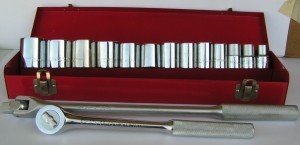
Sparta branded socket set made by New Britain Machine – Circa 1970’s
These days the 2 tier system lives on with the budget Evercraft line, alongside today’s focus, the premium Carlyle line.
Named after NAPA Co-Founder Carlyle Frasier, Carlyle has been NAPA’s premium line since 2012. I’ll admit I was reluctant to put much faith in the brand at first. Being new and consisting primarily of imported items, I looked at the tools at my local NAPA on multiple occasions, but never bought a thing. I was finally persuaded to give them a shot by a friend of mine who is a Diesel Mechanic at the County bus garage. When he saw the Carlyle catalog laying on my bench, he remarked that he used Carlyle almost exclusively and had been very satisfied with them. Based on his recommendation, I decided to give Carlyle a shot.
Power 90 Series Ratchets
My first Carlyle pickup was a Power 90 Series ratchet. Ratchets are the cornerstone of any hand tool line. There are many very nice quality Taiwan made ratchets on the market today, but most are based on a Rotar design, and despite being available under not less than 30 brand names, they are pretty much identical. The Carlyle Power 90 Series ratchets are not just another brand name on the same ratchet, they are (as far as I can tell), unique to the Carlyle line.
Features & Design
I usually talk about a tools strengths, then throw in any unflattering qualities at the end. Today I’m gonna change it up and talk about the negative first. The chrome isn’t going to wow you. It appears a bit on the thin side and lacks that “blind you on a sunny day” bling that you expect from a high quality ratchet. I find that odd because my other Carlyle products have excellent chrome. Whatever the case may be, the chrome is pretty much where the negatives end.
Now for the positives. As you would expect a 90 tooth ratchet to be, this thing is incredibly smooth. Requiring just 4 degrees of swing to operate, it’s a joy in tight spots as well. It’s not leaps and bounds ahead of a 72 tooth rat, but I suppose every little bit helps in a pinch. Ok, it’s smooth, it has a lot of teeth, blah, blah, blah, let’s tear this bad boy down and see what it’s really got going on.
Let’s start with a little disclaimer: Taking a ratchet apart varies greatly in difficulty from model to model. Some ratchets are very simple, some very complex. I have taken at least 200 or so ratchets apart, I am in no way a novice at this stuff, and I caution you that the P90’s are some of the more complex mechanisms I have encountered. Completely disassembled, it consist of 11 individual parts, 8 of which are internal parts. In other words, disassemble at your own risk!
As I do with every ratchet I get, I immediately began taking it apart to truly evaluate the tool. When I popped the faceplate off I was pleasantly surprised to find it was not shipped dry like many ratchets these days seem to be. It used a light machine oil, but experience tells me that replacing that with Permatex Ultra Slick Engine Assembly Lube (aka Red Lube of Love) will produce a smoother operation.
As I stated in my disclaimer, I was surprised at the fact this thing had 8 internal parts. I’m not sure I’ve ever encountered a single pawl ratchet with that many internal parts. It’s not a bad thing, just unique. While our ratchet is a 3/8″ standard length, fixed head, comfort grip, without quick release, there are many variations of the P90 Series that incorporate quick release, flex heads, long length, and traditional metal handles as well. Whatever your preference may be, there’s a P90 ratchet for you.
Performance
Since I got this thing, I’ve been using it for just about everything to really get a feel of it’s personality. The most demanding of tasks up to this point in it’s life has undoubtedly been the winter service on my tractor, mower deck, and rotary tiller. Lot’s of dirty, stubborn fasteners to contend with. For most of this, I would typically use a long handled ratchet and an impact wrench, but I wanted to put this thing on trial, so I went with it. I powered through fastener after fastener, even busting a few with my foot and a couple with a cheater bar, but the ratchet just kept plugging along. I should also note that changing out the factory lube with the RLL had no noticeable effect on the ratchets smoothness, so spare yourself the trouble of tearing it down for no reason.
Another task at which I found the ratchet to particularly excel at was turning a tap socket. The 90 tooth mechanism really provides a great feel for what the tap is doing in conjunction with the work piece.
Another noteworthy attribute of the P90’s is the head size. They come in at 12.5 mm thick with an extreme width of about 30.4 mm. Compare that to the new HF Pro ratchets at a thickness of 12.85 mm and a width of 32 mm or the notoriously thin Proto J5249 with a thickness of 12.3 mm and a width of 38 mm, and we can reasonably conclude that the P90 is a pretty compact head design.
To me, the most significant attribute of these ratchets is something most people never even think about, tooth engagement. Tooth engagement refers to the number of teeth that are in contact with the pawl at the point when force is applied to the fastener and it directly relates to the torque the ratchet can handle. In theory, the more teeth that engage, the greater the contact area, and the stouter the ratchet. I’ve seen as little as 4, average for a fine tooth ratchet is probably 7-8, but the Power 90 engages 13. That’s a bunch of engagement and more than even the Snap-On dual 80’s. The entire pawl is essentially engaged at once. That’s unusual for a single pawl and helps justify the complexity of the design. The only other ratchet I’ve encountered with that many teeth engaged are the Proto/Facom “palm control” ratchets which are known to be very strong.
Conclusions
The Power 90’s are winners in my book. I might even go as far as saying they are the nicest Asian ratchets I have ever used. With 90 teeth, thin profiles, 13 tooth engagement, and vast options, I really don’t see where you can go wrong. Carlyle focuses more on traditional distribution methods exclusively through NAPA, but they are now available online as well.
If Carlyle interests you, you should also take 5 minutes and sign up for the Carlyle Club. Membership is free and will get you 10% off purchases and access to members only promotions as well.
We have more to come from Carlyle, so stay tuned to TIA!



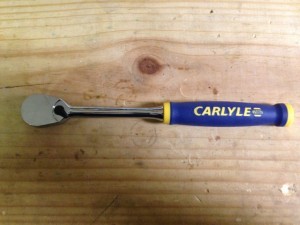
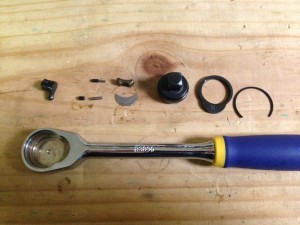
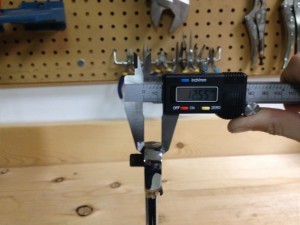
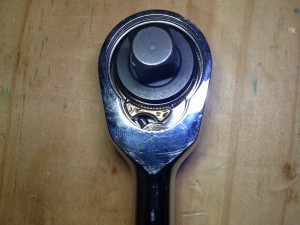
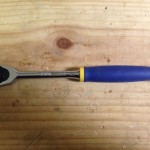
Very nice and detailed write up Travis! We’ve had a little Napa store around the corner from where I live and always forget that it’s there it’s in a wierd corner that I never drive by but my gramps loves goin there he loves the quality of there parts compared to autozone. I’m gonna have to stop by there and check out there Carlyle line cus U can’t have to many ratchets. Thanks conductor!
They look pretty good. Not cheap by any means either price or quality. Nice review.
Damn you, Travis, I see more money flying out of my wallet soon! Nice review. I always wondered where the Carlyle name came from (but was too lazy to look for myself).
Thanks Kurt. There’s surprisingly little brand information available online about Carlyle. This is actually the first article I’m aware of that touches on it at all. If there is anything else, it must be somewhere obscure.
I have at least 2 more Carlyle reviews in the works, but I have to admit I’m impressed thus far.
Dang!! What a write up Travis. If I could I would go run out buy every hand tool in the planet. Specially the ones you review. So much detail & pictures to back it up. I’m a hand tool junkie & I have more than I use, but I love to see tools. Thanks for the great review. Laters TIA
You always do a good job writing up these hand tools. Thanks. That ratchet action, pawl, and shift mechanism are eerily similar to an Apex Gearwrench.
Thanks John! Do the Gearwrench rats use a shim to hold the selector lever in like this one?
Yeah, yeah, yeah. NAPA is my first-call for auto parts when I’m buying locally (“need them today or tomorrow” items.) The local store hours suit my weekend wrenching proclivities, and I can read their catalog monitor screens at least as well as the newer countermen.
Having said that, I’ve bought some NAPA sockets, and for the most part, I’ve liked them. When they wear out or break, I’ll take them in for warranty replacement, and I’ll give them my damaged Made-In-USA sockets, and they’re going to give me…import crap.
This is much like Lowes, which started out the Kobalt line with tools made by Williams (a Snap-On company from their industrial division), then downgraded to USA Danaher tools, and has now dropped the USA sourcing and gone to Asia. How would you feel, buying USA Kobalt, and getting Made-In-China junk as the warranty replacement?
As far as NAPA goes, I’m old enough to remember when their big ad campaign for the tool buyer was to provide warranty replacements for Craftsman tools–because NAPA and Sears were using the same tool sub-contractor. A NAPA ratchet repair kit dropped right into a Craftsman ratchet, the heads were identical Handle shape was different.
So what is NAPA going to do in five or ten years when the Carlyle brand loses it’s luster? How many Carlyle tool owners are going to have orphaned tools with no direct replacements when NAPA introduces the Next Big Thing, in a long procession of Next Big Things, in their tool line?
How much respect can you have for a company when their ratchet handle design is a rip-off of The Major Player?
Pretty clear that even though these tools are “house branded” by contract factories and most of them made in Asia due to cost constraints, NAPA is pricing them unrealistically high. Reminds me of NAPA “Ultra Premium” brake rotors–made in China like all the other brands. What’s “Ultra Premium” about that?
No thanks. I’ll pass.
I have Snap-on double box end wrenches (that I bought some 40 years ago) that I cannot get replaced, because they no longer make or sell them.